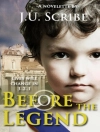In ‘Told in the East, ‘ Talbot Mundy presents a mesmerizing collection of tales steeped in the rich cultural tapestry of the East. Through vivid storytelling and evocative prose, Mundy transports readers to exotic locales, showcasing his profound understanding of Eastern traditions and philosophies. The book’s literary style harmonizes poetic language with an adventurous spirit, encapsulating the allure of a world both foreign and familiar. Set against the backdrop of early 20th-century imperialistic intrigue, these stories challenge the Western perceptions of the East while simultaneously celebrating its mysteries and nuances. Talbot Mundy was a prolific author and adventurer whose own experiences in India and the surrounding regions significantly influenced his writing. His extensive travels and interactions with diverse cultures provided him with a wealth of material and a unique perspective. Mundy was known for his fascination with spiritualism and the mystical elements of Eastern tradition, which permeate his narratives, offering insights into a world where the real and the supernatural coexist seamlessly. Readers seeking an enriching literary journey will find ‘Told in the East’ an entrancing read, as it not only entertains but also enlightens. Mundy’s skillful weaving of history, adventure, and mysticism invites readers to explore the complexities of Eastern life and thought, making it a valuable addition to the canon of cross-cultural literature.
Sobre o autor
Talbot Mundy, born William Lancaster Gribbon on April 23, 1879, was a prolific English-born American writer of adventure fiction. Often drawing from his own experiences in Africa, India, and the Middle East, Mundy is best known for his novels set in exotic locales. His work ‘Told in the East’ (1920), a collection of short stories, reflects his mastery of incorporating the mysticism and adventure of the East into his narratives, captivating Western readers with an appetite for the foreign and the thrilling. Mundy’s literary style is characterized by a blend of romanticism and realism, marked by vivid descriptions and a deep understanding of the various cultures he depicts. His narratives frequently explore themes of colonialism, spirituality, and heroism. Though his fame has waxed and waned over the years, Mundy’s influence can be seen in the works of contemporary adventure writers and in the broader genre of speculative fiction. His writings are often cited for their ability to transport readers to the far-off worlds of the early twentieth century’s imperial frontiers. Mundy passed away on August 5, 1940, leaving behind a legacy rich in adventure and romance, embedded within the literary tapestry of early 20th-century fiction.












